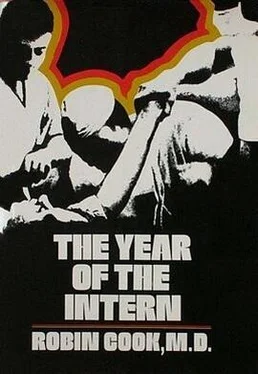“Yes, this morning. A hernia repair,” she replied. “And he’s not in good shape. The breathing difficulty has been going on for several hours.”
“All right, I’ll be over to see him in a few minutes. Meanwhile, have a portable X-ray machine brought to the room and get a chest film. And get me some blood for a complete blood count, and be sure there’s a positive-pressure breathing machine and an EKG machine on the floor.”
I didn’t want to wait the rest of the night for that stuff. Maybe I wouldn’t need it, but all the better if it was there anyway. When I got out of bed, Karen didn’t budge. Not that it mattered. As I put on my clothes, I thought again what a convenience she was. Her apartment was just across the street from the hospital, even closer than my room in the quarters. It held all the creature comforts — television set, record player, a refrigerator well supplied with beer and cold cuts.
Karen and I had started seeing one another four months earlier, just after I had looked at her unusual pelvic X-ray the night she fell down the hospital stairs. Right after that she had been moved to a day shift, where we met again and started having coffee breaks together. One thing led to another, and going to her apartment became a habit — just about the time Joyce stopped being one.
Joyce, who’d been switched to the day shift, too, began wanting to play the tourist, make all the night spots. With that came some pressure to meet her parents and an increasing distaste for those surreptitious leave-takings in the early-morning hours. I tried to go along with her, but her roommate, the TV addict, was still there, and our relationship, which hadn’t been very healthy to begin with, finally went completely sour. In any case, Joyce and I decided to cool it a while, to give ourselves a chance to think.
Karen did have another boyfriend, who continued to puzzle me. She saw him every now and again, perhaps two or three times a week, when they would go to a movie or even to a night club. She said that this fellow wanted to marry her, but she couldn’t make up her mind. I didn’t know him, or much about him, although we had talked once, briefly and quite by accident, when he phoned Karen’s place. On the whole, I was not inclined to imperil a good thing by further investigation.
On my way over to see Supercharger’s patient, I noticed that the night was unusually quiet, with almost no wind, although a low bank of clouds hung over the island, obscuring the sky. It had been raining hard all week. As I walked around to the west end of the hospital I glanced over into the ER, and the memory of my blind, exhausted bustle there came rushing back. I could see the usual clumps of activity, with people waiting and nurses appearing for fleeting moments in a seemingly disorganized jumble. It looked a little busier than usual for a Tuesday night, and I hoped that it would stay quiet enough not to require my presence. Whenever I got a night call from the ER, it usually meant an admission — probably surgery, and that could be bad.
The hall of the ward was deathly quiet and dark except for the little night lights that peeked out of the rooms as I walked briskly past them toward the nurses’ station. The nurses’ station was at the far end of the ward, and as I approached the light gradually grew brighter. It was a familiar sensation to me by now, walking down those dark corridors, the silence broken only by an undercurrent of hospital sounds — the light tinkle of an IV pole, an occasional sleepy moan — sounds that always made me feel I was alone in the world. Other doctors have told me of similar feelings. Actually, I had stopped analyzing the hospital and its effects on me as much as I used to, having become, in a sense, blind to my surroundings. Like a blind man, I took for granted the landmarks, the various doors and turns, and often reached my destination without noting my route or my thoughts along the way.
Some months ago the operator had called me in the early-morning hours for a cardiac arrest. I had gotten up, dressed, and run all the way over to the hospital before I realized that she had forgotten to tell me where the patient was, in which ward. Fortunately, I had guessed right about the location — through some sixth sense, you reached the point of being so routinized that when you were awakened you automatically plugged in the right information without being told.
This had its occasional disadvantages — as, for instance, on one of the frequent night calls to see a patient who had fallen out of bed. I made the automatic, insensate run to the ward and found him there, in good shape, of course. After calling his doctor, I left an order for an injection of Seconal, to be sure he’d sleep, and then plodded back to bed. All without ever coming fully awake. The same nurse called just a little later to say that the patient had fallen again, this time down a flight of stairs. So I got up again, plugged in the ward, and started off. In the middle of the journey, while climbing a flight of stairs, I stumbled across an inert mass lying on the landing. Standing there, dazed, I took fully ten seconds to reprogram myself to the fact that lying before me was the patient I had come to see. He should have been on the floor above! But, of course, he was where he was because he had fallen downstairs. Being totally limp during the fall, he hadn’t hurt himself a bit. It turned out that all his shots — the painkiller, his antihistamine, his muscle relaxant, and my Seconal order — had been given simultaneously by the nurse and had taken effect at the same time, just as he took the first downward step.
I didn’t always walk around in a fog. I simply developed an uncanny ability to continue sleeping while on the way to do some stupid job in the middle of the night. It was different when I got called for something serious, or when I was angry. But since our hospital suffered from an epidemic of patients who habitually fell out of bed, I learned to carry out that mission only half-awake.
The nurses’ station seemed as bright as a television studio after that long walk in the dark. The nurse was effusively glad to see me and ticked off what she had done. The blood had been sent up and the X ray taken, and the EKG and positive-pressure breathing machines were both standing ready in the patient’s room. I took the chart from her hand and scanned the work-up, which, of course, had been done by a fellow intern. A box of chocolates beckoned from the nearby desk, and I popped a couple in my mouth. Temperature was normal. Blood pressure was up and pulse very high. The rum-cherry centers were particularly good. I could find nothing to explain the breathing trouble. All seemed more or less normal for a recent hernia operation.
I turned back down the hall and retraced my steps almost to the end. Entering the room, I snapped on the light, illuminating a pale-looking man propped up in bed and forcibly inhaling with each breath. As I got closer I could see that he was quite diaphoretic, with beads of perspiration glistening on his forehead. He glanced at me for a second and then looked off, as if he had to concentrate on his breathing. Squinting, I realized I could see the apartment building next door, and Karen’s window, the second from the right on the third floor. I wondered if she knew I was gone.
With my stethoscope in my ears, I pushed the patient forward and listened to his lung fields. The breath sounds were clear — no popping, no crackles, no rhonchi, no wheezing. Nothing there. Perhaps his lung fields sounded a little high; that seemed to go along with the fact that his abdomen was swollen and rather firm. It was not tender, however. Listening to his abdomen, I heard the familiar, reassuring gurgles. The heart sounds were normal; he had no signs of cardiac failure. About all that remained was to see if his stomach was full of air. Gastric dilatation was a frequent problem after general anesthesia. I told the nurse to get a nasogastric tube, and meanwhile I hooked up the EKG machine. These EKG contraptions were a source of irritation to me whenever I tried to use one at night, with no technicians around to help. Since I could never seem to get a good electrical ground, the tracing would wander all over the page. But I got this one going okay by hooking the ground wire to the drainpipe of the sink, and I took a tracing while the patient lay there still puffing hard. The nurse had returned with the nasogastric tube before I finished with the EKG. As I greased the tube, I couldn’t help thinking of that doctor sleeping away at home while I was putting in his NG tube.
Читать дальше












